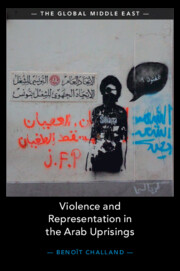‘Empirically rich and theoretically compelling, Challand's book has much to tell us about how informality generates formal political change, collective imaginaries and “latent citizenship”, and how violence, creatively understood, responds to the shackles of what can appear to be an unshakable reality. A splendid work that communicates with theory from the Global South and helps us rethink democratic theory based on the Arab uprisings.'
Mohammed Bamyeh - University of Pittsburgh
‘An outstanding and unique work which provides the reader with an enticing account of the place of political violence and a fascinating analysis of the role of representation in and around the Arab revolutions. It is an intellectually fluent work which expands our understanding of these events and their aftermath.'
Mohammad-Mahmoud Ould Mohamedou - Geneva Graduate Institute
‘Benoit Challand, combining historical and contemporary research, brings an original perspective to the analysis of the Arab Spring. Comparing Tunisia and Yemen through their colonial histories and contemporary conflicts, he explores the role of violence in popular protests, their representations in graffiti and the emergence of new forms of citizenship.'
Bryan S. Turner - Australian Catholic University and the Graduate Center CUNY
‘Violence and Representation in the Arab Uprisings draws on extensive fieldwork, on deep knowledge and on research over many years in case study countries, Tunisia and Yemen, and across the region. Interviews, ethnography and discourse analysis underpin the arguments that challenge our understanding of violence, democracy, citizenship and state-society relations in the Middle East, Africa, Europe and the West. With a historical investigation into the destruction and fragmentation of state-society relations under colonialism, continued in the post-colonial period, Benoît Challand explains the emergence of latent and suppressed citizenship in the region. From latent citizenship to the revolutionary dynamics of the uprisings, new forms of democratic participation have emerged. In analysing these, Challand develops new theories and understandings of violence, democracy and representation and explores how these played out during the 2011 uprisings.'
Jessica Northey
Source: The British Journal of Middle Eastern Studies
‘Challand’s approach is well constructed. The ow of information he supplies, in line with the historic and theoretical positions discussed, gives the reader a robust account of the complexity of Arab politics. His linking of the historic backgrounds, colonial rule, and Arab independence paves the way for his analysis of the Arab uprisings of the 2010s and lays the foundation for this seminal work on vis populi, the power or force of the people.’
Source: Mediterranean Politics
‘This book is a tour-de-force valuable both for its innovative argumentation and for the conception of critical scholarship that overcomes narrow limitations of paradigm, theory and method.’
Andrea Teti
Source: The International Spectator
‘… a fluid and intellectually rigorous examination of Arab socio-political dynamics rooted in colonial and post-colonial history with a focus on the 2011 uprisings and their aftermath.’
Lorenzo Ghione
Source: Maydan: rivista sui mondi arabi, semitici e islamici



